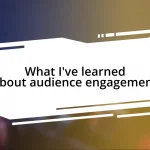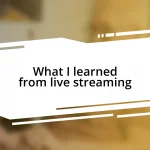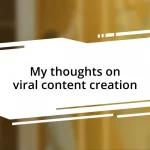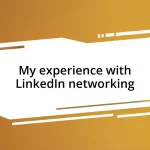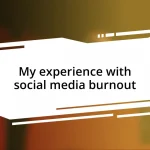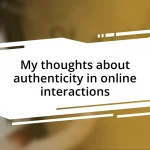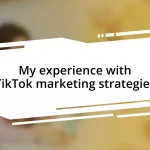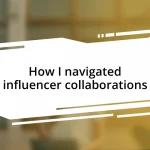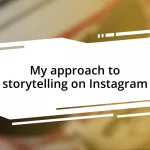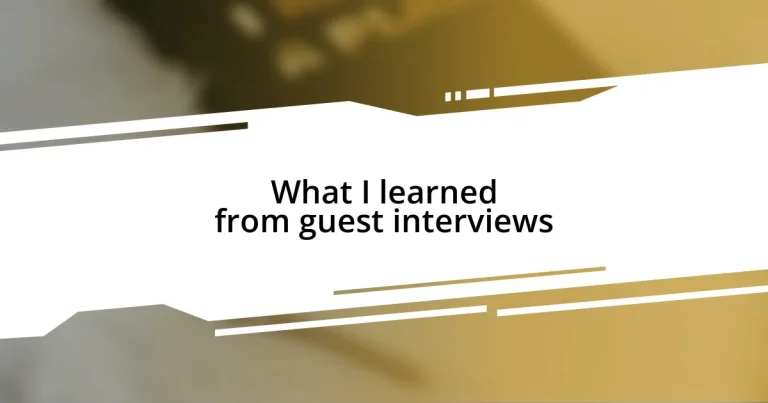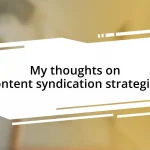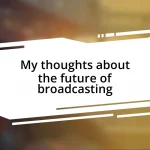Key takeaways:
- Active listening and open-ended questions enhance the depth of discussions and reveal authentic insights from guests.
- Building rapport through shared interests, non-verbal communication, and humor creates a comfortable atmosphere for more engaging conversations.
- Analyzing guest insights post-interview can uncover valuable patterns and emotional depth that drive personal and professional growth.
- Following up with guests helps reinforce connections, encourages ongoing dialogue, and transforms insights into collective wisdom.
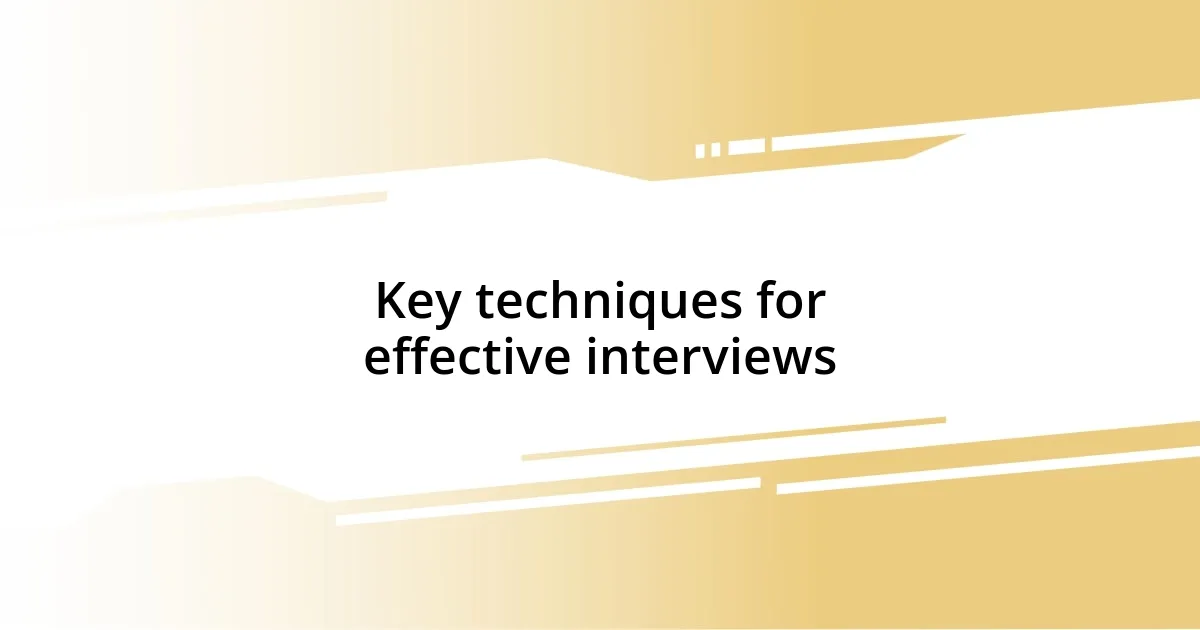
Key techniques for effective interviews
One technique I’ve found invaluable in conducting effective interviews is active listening. I remember a time when a guest shared a heartfelt story about overcoming obstacles, and I could feel the emotion in the air. Instead of immediately jumping to the next question, I paused to absorb their words, which led to a more profound and meaningful discussion. Isn’t it fascinating how a moment of silence can sometimes say more than words?
Another approach is to ask open-ended questions that encourage guests to share their stories authentically. Instead of asking, “Did you like working in that project?” try “What was your experience like on that project?” Throughout my interviews, I’ve noticed how often this small shift opens up a floodgate of insights. It makes me wonder—how often do we underestimate the power of a single question in unlocking someone’s narrative?
Lastly, I’ve discovered that setting a relaxed tone can work wonders. I often start interviews with light, casual conversations, which helps put my guests at ease. I still recall chatting with a nervous guest before hitting record, and it transformed the whole vibe of our session. Have you ever noticed how comfort can turn a standard interview into a heartfelt exchange where genuine insights flow?
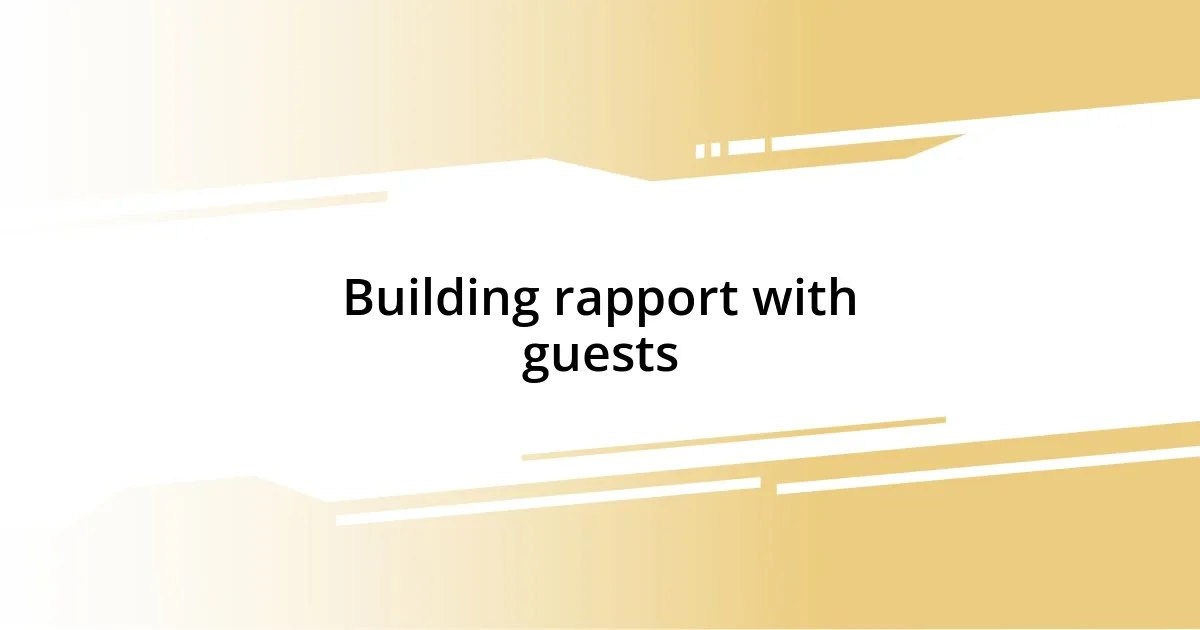
Building rapport with guests
Building rapport with guests is essential for creating a comfortable atmosphere during interviews. I remember one particular instance where I began an interview talking about a mutual interest—our love for travel. This simple connection helped break the ice and allowed my guest to open up much quicker than I anticipated. Establishing common ground can be a game changer; it transforms an interview from a formal Q&A into a genuine conversation.
Another crucial aspect is non-verbal communication. I’ve often emphasized the importance of maintaining eye contact and using encouraging nods during interviews. For example, I once interviewed a guest who seemed hesitant to share their story. I made sure to lean slightly forward, offering subtle gestures of understanding. In doing so, I noticed their defenses slowly coming down, allowing them to share more personal insights. It’s fascinating how body language can pave the way for openness.
Moreover, I find humor to be an effective tool in building rapport. I recall one interview where a light-hearted joke about a shared experience brought laughter and eased the initial tension. This laughter not only lightened the mood but also fostered a sense of camaraderie, making my guest feel more like an equal partner in the conversation. Isn’t it incredible how humor creates bonds, making interviews feel less like interviews and more like engaging discussions?
| Technique | Description |
|---|---|
| Common Ground | Finding shared interests helps create an immediate connection. |
| Non-verbal Communication | Using eye contact and body language to convey understanding and encouragement. |
| Humor | Employing light-hearted jokes to ease tension and foster camaraderie. |
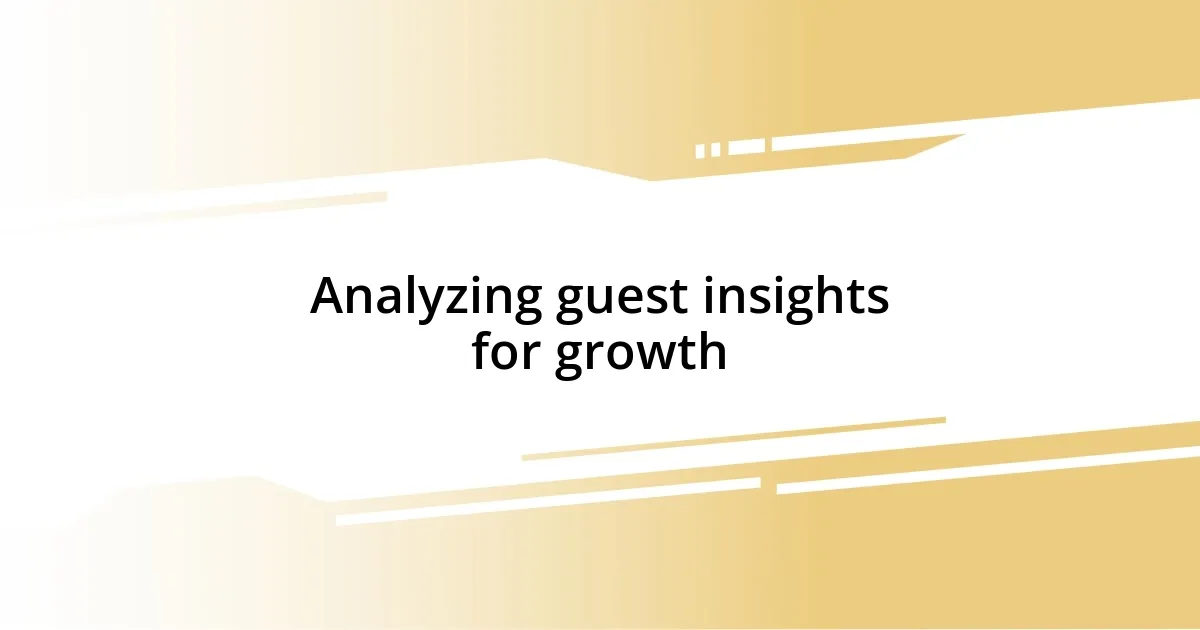
Analyzing guest insights for growth
Analyzing guest insights can be a transformative process that directly influences growth. I once interviewed a guest who shared a unique perspective on failure. As they articulated their journey, I felt a profound sense of connection. Their story wasn’t just about obstacles but also about resilience, which taught me how important it is to delve deeper into the layers of our guests’ experiences. When I reflect on insights like these, it opens my mind to new opportunities for development and understanding.
To maximize the benefits of these insights, consider the following approaches:
- Look for Patterns: Pay attention to recurring themes in multiple guests’ stories. This can indicate broader trends that are worth exploring further.
- Seek Emotional Depth: Don’t shy away from the tough topics. Guests often provide their most valuable insights when discussing their challenges.
- Reflect and Act: After each interview, take time to reflect on what you learned and how it can be applied in your own practice or industry.
- Share Findings: Discuss insights with your team to inspire collective growth and innovation.
By dedicating time to analyze what guests share, we not only enrich our understanding but also drive meaningful changes in our own paths.
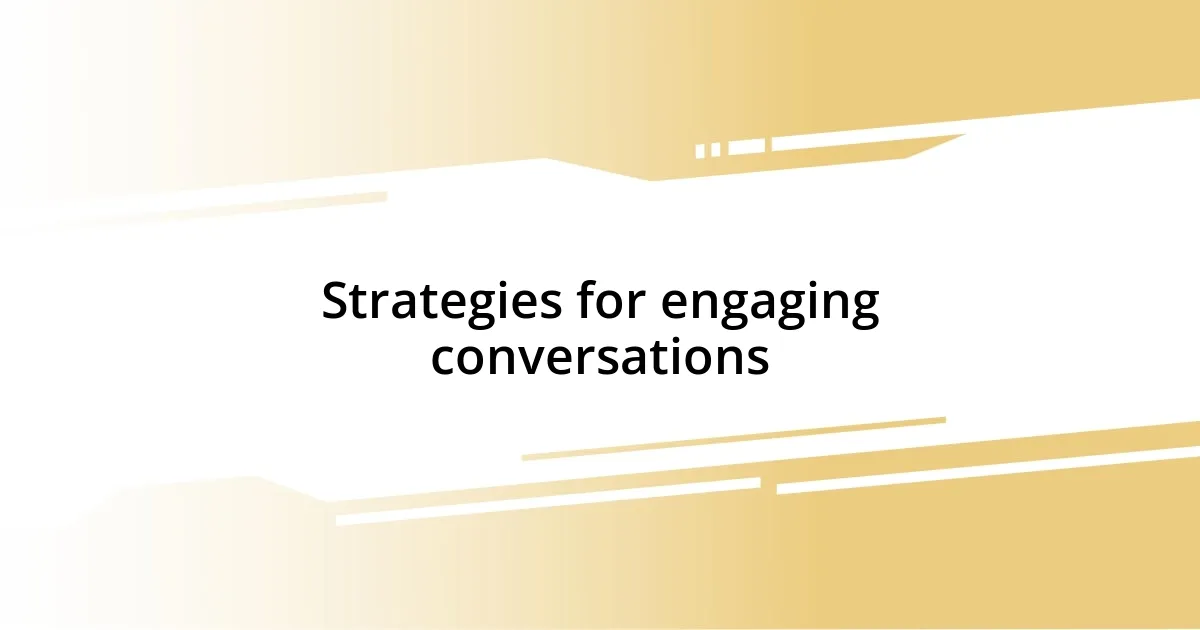
Strategies for engaging conversations
When it comes to engaging conversations, listening actively is one of the most powerful strategies I’ve found. During an interview with an author, I noticed they lit up when discussing their writing process. Instead of sticking rigidly to my prepared questions, I leaned in and let my curiosity guide the conversation. This shift allowed the discussion to flow more naturally, revealing fascinating insights that neither of us anticipated. Isn’t it amazing how being genuinely interested can lead to unexpected discoveries?
Another effective strategy I employ is asking open-ended questions. For instance, I remember an interview with a tech entrepreneur. When I asked about the challenges they faced in their startup, their answer took us into a rich discussion about innovation and failure. Engaging guests in this way not only gives them the space to share their stories but also encourages deeper reflections that resonate with the audience. Are we sometimes afraid to venture into those deeper questions when we should lean into them instead?
Lastly, I’ve learned that sharing a little about myself can help establish a connection. In one memorable conversation, I shared my own struggles with time management after my guest mentioned their techniques for productivity. This led to a candid exchange where we both explored our vulnerabilities. Vulnerability creates a bond, doesn’t it? It transforms the conversation into a collaborative exploration rather than a one-sided interview, allowing both parties to learn from each other.
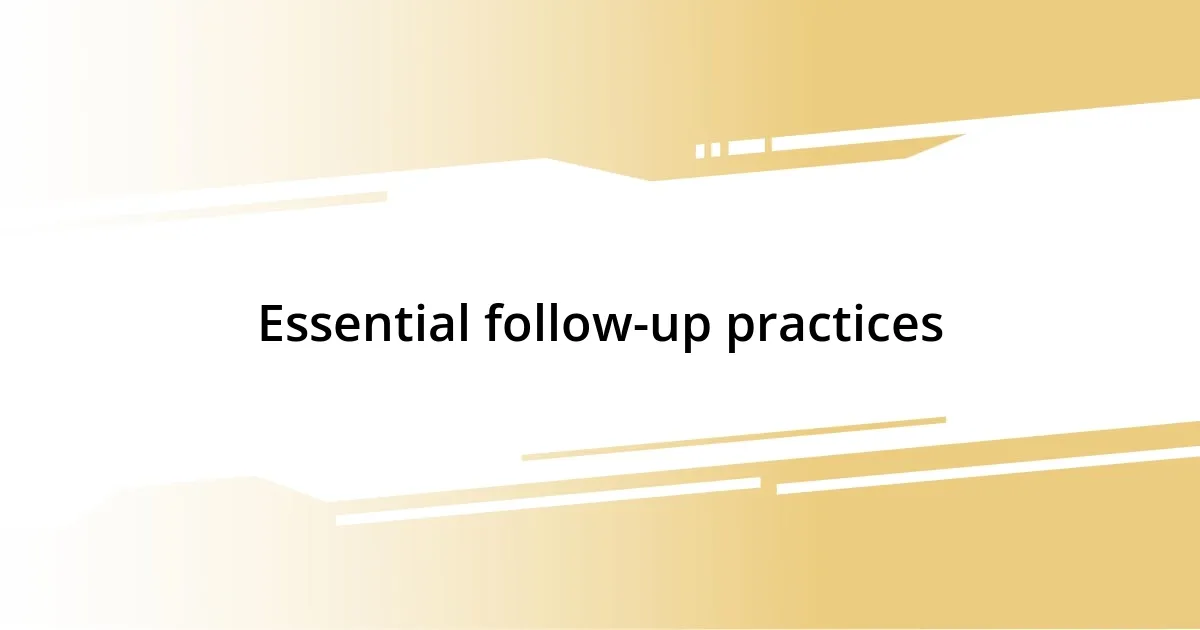
Essential follow-up practices
Essential follow-up practices play a crucial role in amplifying the value of what I’ve learned from guest interviews. One thing that I’ve found invaluable is sending a personalized thank-you note prompt after an interview. It not only expresses gratitude but also keeps the door open for future conversations. I recall reaching out to a guest after our chat, sharing how their insights influenced my approach to my work. The response was overwhelmingly positive, and it fostered a deeper relationship than I had anticipated.
Additionally, revisiting key points from the interview can spark meaningful dialogues. I once followed up with a guest who shared their experience with stress management. I asked how their strategies had evolved since we last spoke. Their thoughtful response not only enriched my understanding but also offered fresh insights that I hadn’t considered before. This ongoing dialogue reinforces our connection and makes the guest feel valued, don’t you think?
Documenting and sharing post-interview insights is another practice I can’t recommend enough. After discussing a thought-provoking topic about leadership, I compiled my reflections and shared them with my network. It was incredible to see how others were inspired by my takeaways. This practice not only solidifies what I’ve learned but also contributes to a wider conversation. Isn’t it fascinating how sharing can transform solitary insights into collective wisdom?
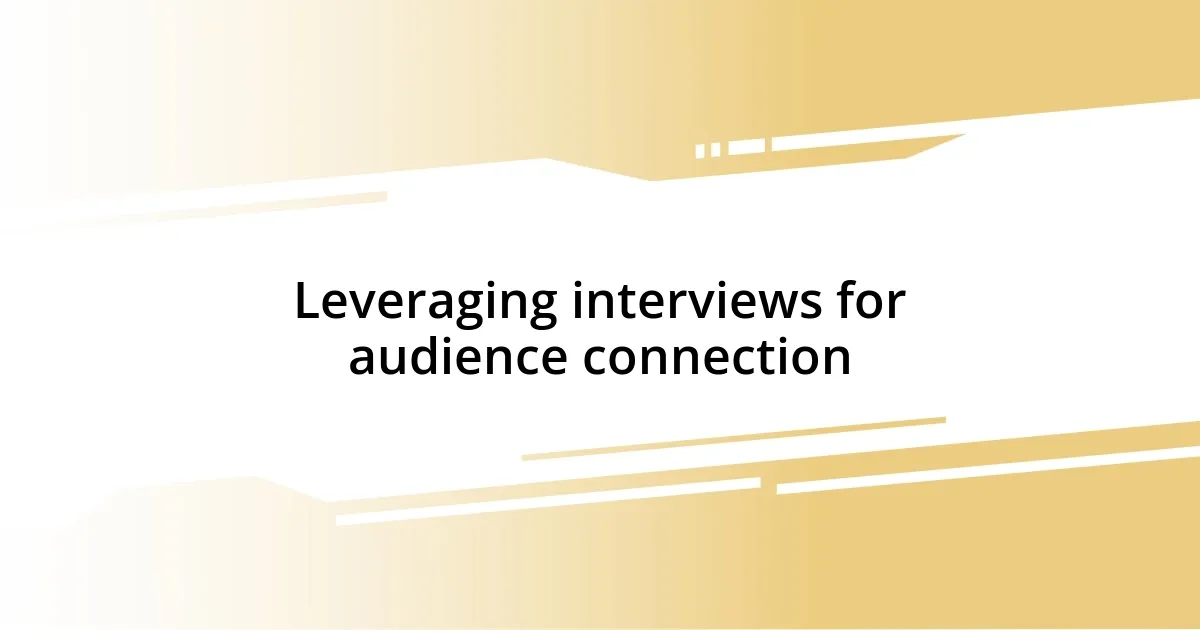
Leveraging interviews for audience connection
Leveraging interviews for audience connection has taught me the immense power of authenticity. During a conversation with a wellness coach, I shared my own journey of overcoming burnout. The moment I opened up, I could see my guest respond with candidness, creating a genuine rapport. It struck me then how vulnerability invites vulnerability; when we both shared our experiences, our audience felt included in a dialogue rather than merely observers of a monologue. Isn’t it remarkable how our personal stories can weave a fabric of connection that draws listeners in?
Another insight I gained is that the nuances of body language and tone during interviews can deeply influence audience perception. I vividly remember an interview where my guest’s enthusiasm about their passion project was palpable. As I mirrored that energy, I could almost feel the audience’s pulse quickening through the screen. This alignment not only made the content more engaging but also fostered a sense of shared excitement. Have you considered how your energy level can either uplift or dampen the connection with your audience?
Finally, I’ve discovered that encouraging guests to share anecdotes related to their journeys resonates strongly with the audience. In one interview, my guest recounted a humorous failure that turned into a learning experience. The laughter that followed was contagious and created a moment of levity that lightened the discussion. Sharing these relatable stories doesn’t just entertain; it builds a bridge between the guest and the audience, turning abstract concepts into tangible lessons. Who doesn’t appreciate a good story that reminds us we’re all human, navigating this wild ride together?
